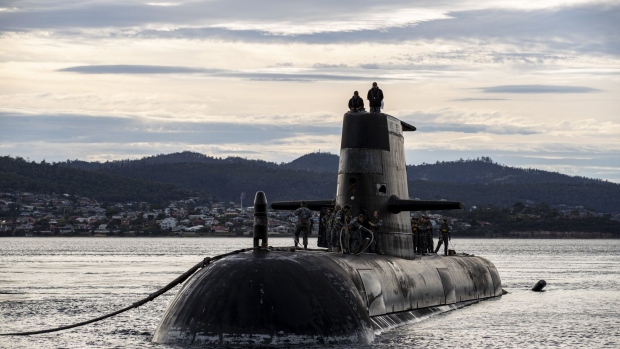Apr 16, 2024
Australia Plans $32 Billion Defense Boost to Face New Threats
, Bloomberg News

(Bloomberg) -- Australia has pledged to increase spending on its military forces by A$50.3 billion ($32 billion) over the next decade, with Defence Minister Richard Marles warning the country faces its “most complex strategic circumstances” since World War II.
“Australia no longer has the luxury of a 10-year window of strategic warning time for conflict,” Marles, who is also deputy prime minister, said in a speech to the National Press Club in Canberra on Wednesday.
The announcement comes as China expands its military footprint in the Asia-Pacific and the US reinvigorates traditional regional alliances to counter Beijing. Australia’s geographic isolation, once a strategic asset, has been diminished as both global growth and geopolitical tensions shift to its part of the world.
The government in Canberra is trying to pivot the nation’s military posture to deterrence, including via drones and missiles, to complement a planned fleet of nuclear-powered submarines that are scheduled to be delivered in the 2030s under the Aukus agreement.
The funding increase will take Australia’s defense spending to 2.4% of gross domestic product by 2033-34, in line with global peers such as France and the UK, but well below the US and China.
Still, only a modest A$5.7 billion of the additional outlay will be disbursed over the next four years. That opens up the possibility of future changes to the program and raises questions over whether Australia’s armed forces will be prepared for a conflict in an increasingly disputed region.
Over the next decade, the government will re-prioritize A$72.8 billion in military spending to meet its new objectives, Marles said. At the same time, Australia will look at closing the gap in its recruitment of new soldiers by attempting to recruit non-citizens to serve the country’s military.
A major report into the state of the nation’s defense forces released by the government a year ago found the military was not “fit for purpose” in the current strategic environment.
Despite the increased spending, there are still questions over whether Australia is addressing the gaps in its military capabilities, said Bec Shrimpton, director of Defence Strategy and National Security at the Australian Strategic Policy Institute.
“We’re not actually looking at getting some of the major capabilities that we’re talking about in place and having this sort of integrated force, fit for purpose, for another decade,” she said. “And given we don’t have that decade of strategic warning anymore, have we got it right?”
(Updates with further details on strategy, analyst’s comment.)
©2024 Bloomberg L.P.